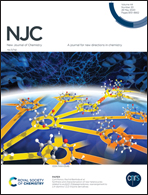Ultrastable conductive microporous covalent triazine frameworks based on pyrene moieties provide high-performance CO2 uptake and supercapacitance†
Abstract
Covalent organic triazine frameworks (CTFs) are a subclass of covalent organic frameworks and conjugated microporous polymers that exhibit heteroatom effects and possess high surface areas and excellent chemical and thermal stabilities; they have applications in energy storage and gas adsorption. In this study, we prepared two microporous polymers the pyrene-functionalized CTFs Pyrene-CTF-10 and Pyrene-CTF-20—through ionothermal treatment of 1,3,6,8-cyanopyrene (TCNPy) in the presence of molten zinc chloride (ZnCl2) at 500 °C (at ZnCl2-to-TCNPy molar ratios of 10 : 1 and 20 : 1, respectively). Pyrene-CTF-10 and Pyrene-CTF-20 had specific BET surface areas of 819 and 1019 m2 g−1, respectively, with pore size distributions of 1.10 and 1.35 nm, respectively, and high char yields (up to 70%). Furthermore, these Pyrene-CTF polymeric frameworks exhibited excellent specific capacitances at a current density of 0.5 A g−1: 380 F g−1 for Pyrene-CTF-10 and 500 F g−1 for Pyrene-CTF-20. In addition, both Pyrene-CTFs had excellent cycling stability, retaining 97% of their capacitances after cycling 2000 times at a current density of 10 A g−1. Moreover, Pyrene-CTF-10 displayed good CO2 uptake capacity (2.82 and 5.10 mmol g−1 at 298 and 273 K, respectively).



 Please wait while we load your content...
Please wait while we load your content...